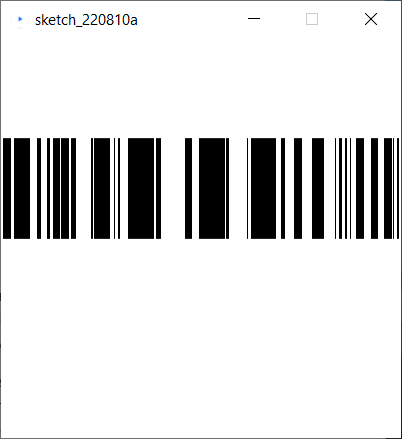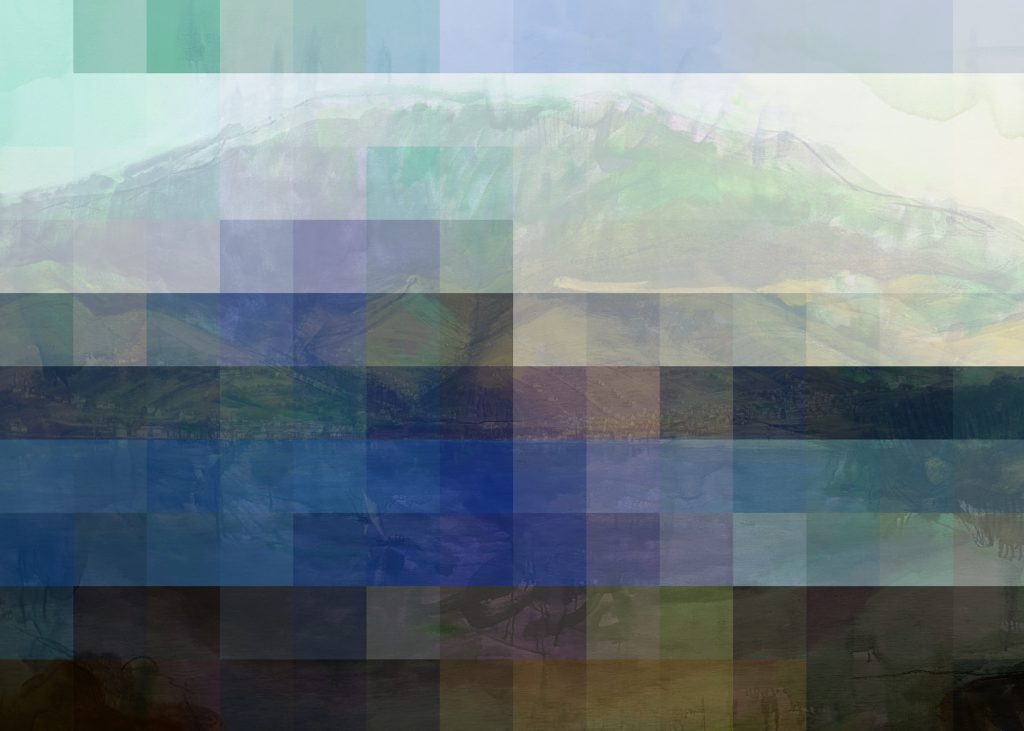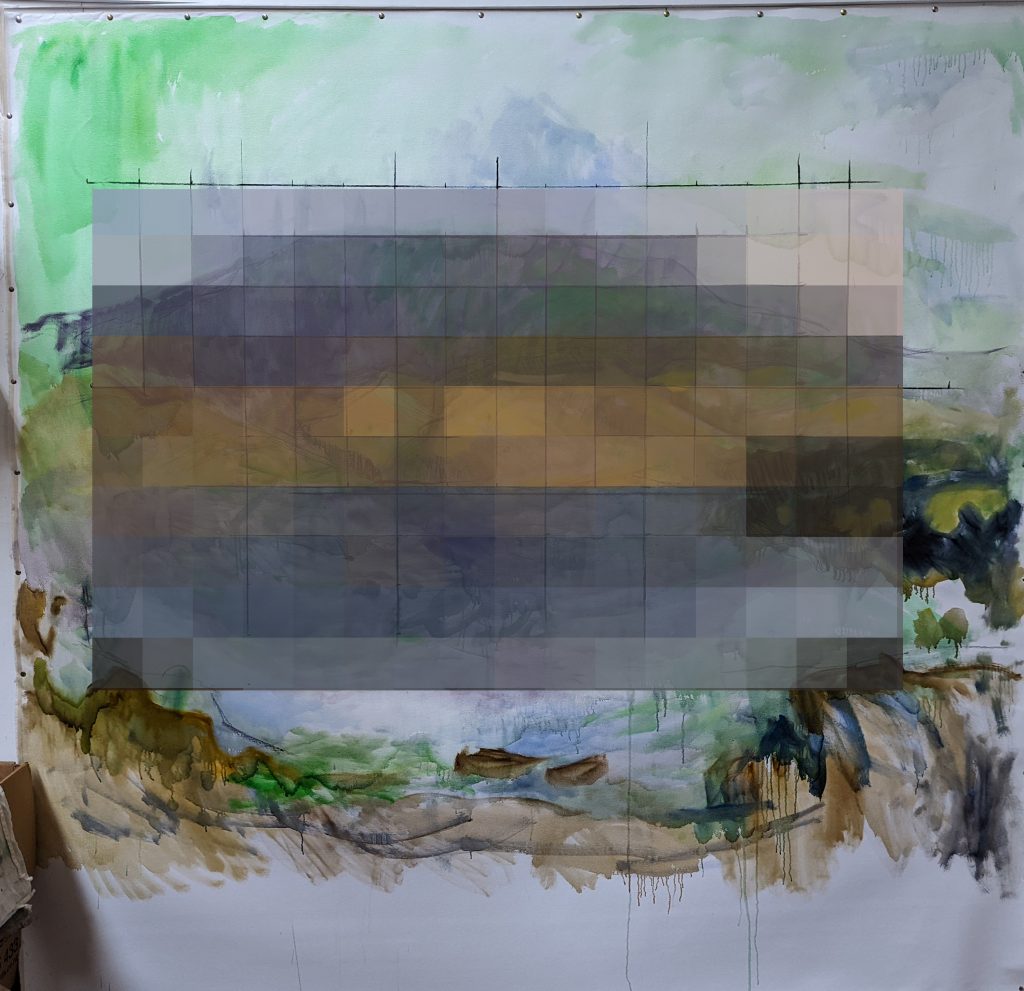10 Aug Things that happen sometimes.

float x = 0;
void setup() {
size(400, 400);
background(255);
stroke(255);
}
void draw() {
line(x, 200, x, 100);
x = x + 1;
if (x > width) {
x = 0;
}
// sometimes we decide to change the line color
if (random(100) > 70) {
// now we decide if to use black or white
if (random(100) > 50) {
stroke(0);
}
else {
stroke(255);
}
}
}
(https://funprogramming.org/18-Things-that-happen-sometimes.html)
Order is appealing: lists, spreadsheets, alphabetically arranged bookcases. It’s not to say things should be tidy, or minimal, just that the information to hand is maybe best when in its most efficient form. In a previous life I thought I’d be a computer programmer.
For a while I quite regularly did soduku puzzles. But what was more fun was making a spreadsheet that answered them for me. Or at least made for minimal educated guesses. Minimised, organised, made more efficient. I enjoy starting a procedure and finding the most efficient way of doing it, jigsaw puzzles, arranging buttons, filing. When I was about twelve, I wrote a Basic program that had all elements of my (limited at the time) wardrobe and would print out a list of possible combinations given certain boundaries – like temperature, event, favourite colour that day.
Of course, life doesn’t fit in boxes like this, things bleed out, slip, shift. It’s fine, the fun is in working out the puzzle, a solution for efficiency. (Agnes Martin)
I find myself drawing grids over works, shifting pixels and moving in and out of tiny details. Pixelating the image simplifies the scene, makes clearer the contrasts and colours, but so much is lost. The hard lines of computer generated pixels are colder, replicable, efficient perhaps. Once they’re drawn, painted, the colours bleed, I mix up a square or two and the image is lost. Maybe it would be easier to code the decisions for processing a landscape in some way. This view should be this size. It moves in this way.
Could I take a photo from my phone and send it through some articulated algorithm that makes it my experience of this view. An algorithm like Google has. It knows how old I am, how many kids I have, what my day looks like, my heart rate, where I spend my time, how I spend my time, it searches my photos and picks out my friends, my loved ones, compiles videos for me, it knows before me what I might want to do, where I might want to go. Could it tell me how I experience a place? Make me an image from a simple phone photo that is the painting I want to have painted? What information would it need?
I worked in SEO for years. Watching the increasingly complicated algorithms that Google runs in a frantic impetus to guess what you want before you know, to throw the highest bidder directly into your line of site, into your brain. Early on you could trick the algorithms. Hidden words, white on white, spam text, bolded words and hyperlinks. Clean code helped, following rules, keeping your head down. But eventually (and super quickly) Google caught up and surpassed any trick, any slight of hand. It was no longer a game it was a stacked gamble, and as always the house wins.






Jane Giblin
Posted at 04:03h, 05 OctoberIn the mention you make about the tension between the paint and the virtual image, and the iterations supplied by the virtual, and infinite degrees of engagement, and yet still, the house wins…This is kind of what I meant by loss…for me that would be perhaps more negative than for you, But nonetheless the accumulative algorithmic plentitude, the mass, the volume, the infinite …is its own white noise, and I wonder how this is then as Neil proposes, …controlled? It is defined by experience. It was there, and it was not there. The paint was there, but it was not there. We are here, but we are nothing. There is no answer to this really, sorry. You had me thinking, …thanks. The images are beautiful. Whether they’re meant to be or not, I wonder if this is the vestige of the landscape experience, this place, or if this is just my layer, my response, my nostalgia at work. Paint carries scent, hands, feet. The wind. Or as Neil suggests, control may be just beyond reach. Risk. Where is the risk.
skye
Posted at 08:15h, 05 OctoberThanks for your post – I am happy to hear that there are lots of thoughts prompted. That’s more exciting than answers, although I am hoping at some point I get to at least form some form of answers… Can you explain more about what you think is lost? The originality of the image? The space to make your own images? Something in an experience is lost in a digital record? or something is lost in the sheer volume of images? (or none of those things!) It’s interesting too as I was reading about loss in works painted from photographs, about the fading of images and the spaces but feel like digital images have a very different way of degrading.
It does feel like the online world is shifting very quickly and perhaps we need something new. Maybe we’ll get it at some point. But yes, for now the house wins in the images it gives to us. And we pay for it! The things we’re fed are fed to us by those with the most money and power already,. It used to feel that the online space was perhaps speculative space. It contained infinite possibilities, incomplete and unowned spaces with places to hide. It doesn’t feel like that now, any hiding is suspicious or even nefarious, being exposed or doxxed is terrible – Optus customers would agree… – but we are completely exposed to these large companies, they know everything and why do we trust them? Computers “learn” through the input we’re providing but if this input is being collected (by social media, google etc) as a form of currency everything is increasingly and maybe exponentially commodified. It can maybe only be then that it self-perpetuates in this way. Maybe we can still do something with this? Is this what people do? Find workarounds that shift around new technologies just by being human. Sharpening new skills of filtering rather than finding?
Maybe then yes, painting is actually a way to control this out-of-control-ness. Slowing down for just a bit and actually existing in just that process. (I wonder if it can do that for the viewer too, can they too have this experience of painting (as a verb)? Is this transferrable?
I think the question about what painting means to me is something I will need to think about but… I do think painting is the only time I don’t think of anything else. The act of painting or drawing something that already exists (whether its AI generated or in front of me) is a process of engagement with that thing and that time and a process of shrinking the world into one small (maybe more easily controlled) space. Making lots of tiny comparisons – that colour is bluer than that colour, that line is sharper than that line. And yes, a process of finding something beautiful. That at a certain point what is there is the “right” image.
Thanks again for your feedback and comments. Lots to think about